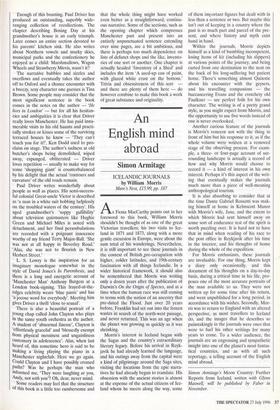An English mind abroad
Simon Armitage
ICELANDIC JOURNALS by William Morris Mare's Nest, £15.99, pp. 187
As Fiona MacCarthy points out in her foreword to this book, William Morris shouldn't be thought of as one of the great Victorian travellers; his two visits to Ice- land in 1871 and 1873, along with a more gentle excursion in Europe, were about the sum total of his wanderings. Nevertheless, it is still important to see these journals in the context of British pre-occupation with higher, colder latitudes, and 19th-century fascination with all things Icelandic. In a wider historical framework, it should also be remembered that Morris was writing only a dozen years after the publication of Darwin's On the Origin of Species, and at a time when the human race was still coming to terms with the notion of an ancestry that pre-dated the Flood. Just over 20 years before, Franklin had set out into the frozen wastes in search of the north-west passage, and never returned. This was an age when the planet was growing as quickly as it was shrinking.
Morris's interest in Iceland began with the Sagas and the country's extraordinary literary legacy. Before his arrival in Reyk- javik he had already learned the language, and his outings away from the capital were a kind of pilgrimage around the Saga sites, visiting the locations from the epic narra fives he had already begun to translate. His obsession with the ancient stories is almost at the expense of the actual citizens of Ice- land whom he meets along the way, some of them important figures but dealt with in less than a sentence or two. But maybe this isn't out of keeping in a country where the past is so much part and parcel of the pre- sent, and where history and myth exist hand in hand.
Within the journals, Morris depicts himself as a kind of bumbling incompetent, losing items of kit (including his slippers) at various points of the journey, and being carted from one destination to the next on the back of his long-suffering but patient horse. There's something almost Quixotic about his encounter with the geysers, and his travelling companions — the buccaneering Evans and the crotchety old Faulkner — are perfect foils for his own character. The writing is of a pretty grand style, as you might expect fronr Morris, and the opportunity to use five words instead of one is never overlooked.
Another curious feature of the journals is Morris's concern not with the thing in front of him but his response to it, as if the whole volume were written at a removed stage of the obserVing process. For exam- ple, a three- or four-page account of sur- rounding landscape is actually a record of how and why Morris would choose to record it — a kind of interest in his own interest. Perhaps it's this aspect of the writ- ing that eventually makes the journals much more than a piece of well-meaning anthropological tourism.
It is also absorbing to consider that at the time Dante Gabriel Rossetti was mak- ing himself at home in Kelmscott Manor with Morris's wife, Jane, and the extent to which Morris had sent himself away on some sort of endurance test of the spirit is worth puzzling over. It is hard not to have that in mind when reading of his race to the post office in Reykjavik after his time in the interior, and his thoughts of home during the whole of the expedition.
For Morris enthusiasts, these journals are invaluable. For one thing, Morris kept a diary only occasionally, and this document of his thoughts on a day-to-day basis, during a critical time in his life, pro- poses one of the most accurate portraits of the man available to us. They were not written up for some time after his return, and went unpublished for a long period, in accordance with his wishes. Secondly, Mor- ris was to return to England with an altered perspective, as most travellers to Iceland do, and the images that he describes so painstakingly in the journals were ones that were to fuel his other writings for many years to come. To a wider audience, the journals are an engrossing and sympathetic insight into one of the planet's most fantas- tical countries, and as with all such reportage, a telling account of the English mind abroad.
Simon Armitage's Moon Country: Further Reports from Iceland, written. with Glynn Maxwell, will be published by Faber in November.


























































 Previous page
Previous page